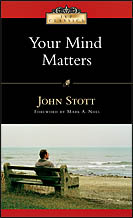
In the section entitled thinking God’s thoughts, John Stott argues Psalm 19:1-4 and Romans 1:18-21
refer to God’s self-revelation through the created order. Although it is a proclamation without speech, a voice without words, yet as a result of it all men to some degree “know God.” This assumed ability of man to read what God has written in the universe is extremely important. All scientific research depends upon it, upon a correspondence between the character of what is being investigated and the mind of the investigator. This correspondence is rationality. Man is able to comprehend the processes of nature. They are not mysterious. They are logically explicable in terms of cause and effect. Christians believe that this common rationality between man’s mind and observable phenomena is due to the Creator who has expressed his mind in both. As a result, in the astronomer Kepler’s famous words, men can “think God’s thoughts after him.” — Your Mind Matters, p.28
Do you agree? Can human beings think God’s thoughts after him? Is this the basis of science and possibly even the use of the mind in general? Is that how you approach decision making, research, teaching, and writing?
Note: For the next post in the series go to Your Mind Matters 3: The Mind in Christian Life.
Tom enjoys daily conversations regarding living out the Biblical Story with his wife Theresa and their four girls, around the block, at Elizabethtown Brethren in Christ Church (where he teaches adult electives and co-leads a small group), among healthcare professionals as the Northeast Regional Director for the Christian Medical & Dental Associations (CMDA), and in higher ed as a volunteer with the Emerging Scholars Network (ESN). For a number of years, the Christian Medical Society / CMDA at Penn State College of Medicine was the hub of his ministry with CMDA. Note: Tom served with InterVarsity Christian Fellowship / USA for 20+ years, including 6+ years as the Associate Director of ESN. He has written for the ESN blog from its launch in August 2008. He has studied Biology (B.S.), Higher Education (M.A.), Spiritual Direction (Certificate), Spiritual Formation (M.A.R.), Ministry to Emerging Generations (D.Min.). To God be the glory!

It strikes me that this viewpoint (that scientific inquiry “thinks God’s thoughts after him”) is sharply at odds with contemporary scientific inquiry. An impression from a non-scientist: such inquiry today requires the suspension of belief in God as part of the process, and thus requires the exercise of belief that God is not part of the process.
Can humans think like God?
well, humans obviously are made in the image of God. Therefore, we can think like him if we abide in him according to John 15.
Abide means ‘to hang out” meaning if abide with Christ then we will be like Christ. If you do not believe or abide with him then you will not think like him.
The holy spirits refines the mind to think like Christ because it is that way that we can be like him.
If a scientist believes in God, then he can reflect the image God intended.
God wants us to use our minds because our minds are his craftsmanship. he put quirks, personalities and intellect to show people who God is like.